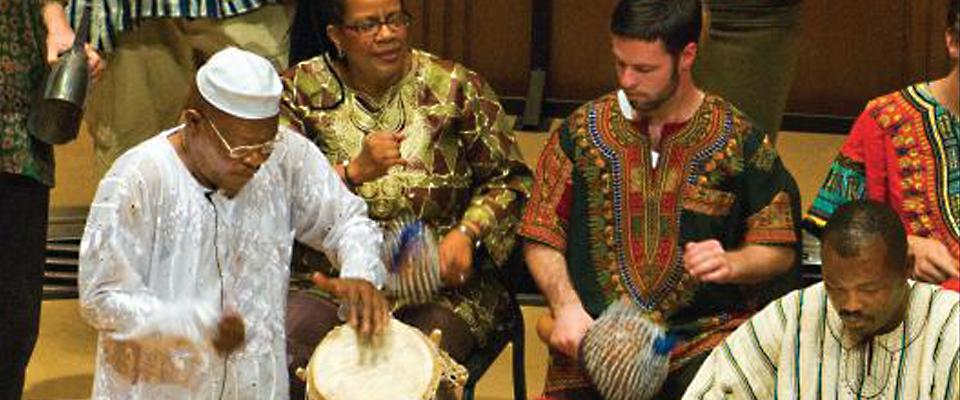Youssou N’Dour continues to introduce new rhythms to world music.
Youssou N’Dour conquered the world in the 1980s with his African fusion music. Now the Senegalese pop superstar is returning his attention to his ethnically diverse homeland, exploring some more of West Africa’s overlooked grooves.
The singer is the master of the infectious style known as mbalax, a combination of West African polyrhythms, rock, and reggae filtered through Cuban son (which has rhythms rooted in West African music). American audiences first heard his Arabian-inflected wail on Peter Gabriel’s 1986 hit “In Your Eyes,” and experienced his charismatic performances in 1988 when he co-headlined Amnesty International’s Human Rights Now! tour alongside Gabriel, Bruce Springsteen, Sting, and Tracy Chapman. A series of international hit records followed, from 1989’s “The Lion” to the 1994 trilingual dance floor anthem “7 Seconds,” with Neneh Cherry. All looked confidently outwards to the rest of the world, turning N’Dour into Africa’s most visible and popular vocalist.
His latest album, Rokku Mi Rokka, looks inward to Senegal’s hinterlands, drawing inspiration from the nation’s northern provinces, bordering on Mauritania and Mali. The album came about, in part, through an encounter with Bah Mody, a popular singer from the northern Tukulor people. N’Dour ended up inviting him into the studio to collaborate on many of the songs. While working with his old comrades from Super Étoile, the band in which he first became a force in African music in the 1970s, N’Dour composed a series of tunes based on the traditional Tukulor wango rhythm (though the album opens with a celebratory mbalax tune “4-4-44”).
“Doing the same thing for more than 20 years, the same music, it’s going to be really tired,” says N’Dour, 48, who brings a finely honed ensemble from Super Étoile to Zellerbach Hall on Saturday, July 26, for a Cal Performances concert. “I’m coming from a country where there’s a lot of diversity of music. I feel a responsibility to bring other music from my country, not only the popular styles. I feel like an ambassador, bringing the music coming from the north and the south. This music is interesting, more maybe than mbalax.”
N’Dour’s musical mission is to raise awareness of these styles both within Senegal and on the world stage. And he wants to remind his audiences that Africa is the source for much of the world’s popular music. “The music tries to tell people that the roots of blues and reggae and Latin music [is from Africa],” N’Dour says.
Bandstands and recording studios aren’t the only outlets for N’Dour’s evangelical impulse. For many years, he has been a Goodwill Ambassador for UNICEF, and lent his time, money, and image to improving the lives of his compatriots in projects ranging from immunization to Internet access. As one of the first African pop stars to emerge in the ’80s with a truly global following, N’Dour is well placed to spearhead such initiatives. He sees the Internet as the perfect vehicle to connect widely dispersed families and provide entrepreneurs with new access to markets. “Eventually the Internet can replace what we in Africa call the council tree, the tree in the center of a village where people come to debate the affairs of the community,” N’Dour says.
Born in Dakar in 1959, N’Dour grew up in a family of musicians. His mother was a griot who taught him the basics of traditional Wolof music, such as tasso, a syncopated talking form akin to rap, and bakou, a traditional chant. He started performing publicly as a child at neighborhood gatherings, developing an impassioned style that gave him a presence unusual in someone so young.
By his mid-teens N’Dour was performing with Senegal’s leading pop group, the Star Band, and had been dubbed “Le Petit Prince de Dakar.” In the early ’80s he recorded a series of albums including the mbalax classic “Immigres.” All the while he maintained close connections with Senegal, performing frequently in Dakar, where he opened a recording studio and a nightclub. His 10-member band Super Étoile has virtually the same personnel as when he founded it, and his music often extols traditional sectors of society, as in his ode to people who work the land, “Beykat.”
“My own extended family comes from the village,” N’Dour says. “When I write a song like this, where I have injected a bit of political commentary, I want to help defend the farmers interests. This song received a very positive reaction in the country.”
Part of what makes N’Dour’s music so potent is the way he anchors his songs in Senegalese reality, while drawing from so many different musical influences. He celebrates the liberating power of education, the dignity of work, and importance of respecting women, while also describing the challenges of life in West Africa, as in his mournful, reggae-inflected “Mademba (The Electricity Is Out Again).” With each new album, N’Dour offers up a message on the necessity of maintaining traditional community while embracing the world’s sounds.
“My music has been characterized by a spirit of traveling, of journey,” N’Dour says. “I’ve found out that the further I go from my origins the more I find myself coming back to them for inspiration. What I’m doing right now seems to me to be the summing up of where I’ve been and where I come from.”





















